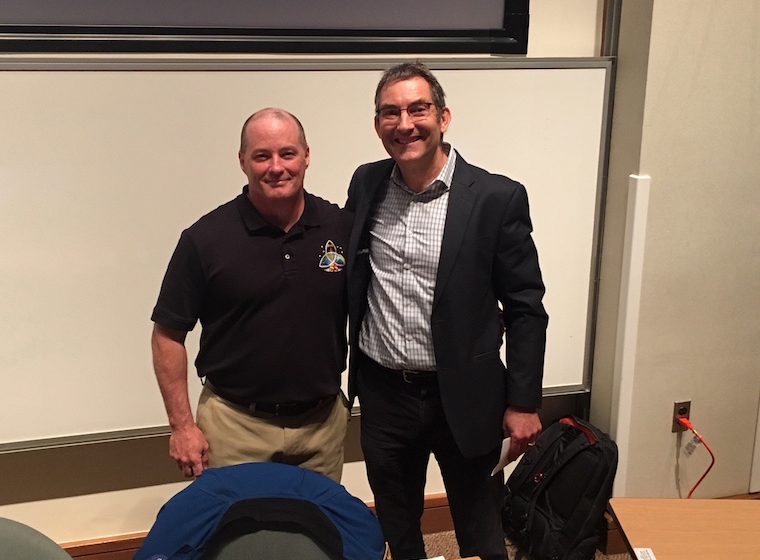We had a fantastic visit yesterday from astronaut Scott Tingle, who spent 168 days on the International Space Station. He spoke to the School of Medicine about his lifelong dream of going into space and what it was like when he was finally made it there. Some of his answers were quite surprising, such as when I asked him about his feelings the night before the launch. I thought he might have been frightened or excited or in a state of disbelief, but he said he was mainly tired. After all the the training and preparations, he was so exhausted he was ready for them to hit the launch button, no matter what may follow.
For Capt. Tingle — he’s a captain in the U.S. Navy — reaching space at one point seemed like an impossible goal. He applied repeatedly, but he ultimately found himself in his 40s and assumed, at that point, that his dream was not to be. But he never gave up. He put in his fifth application, he said, so that he could go to his grave knowing he tried as hard as he could. And that was when he was accepted. This was a major message during his speech yesterday: When it really matters, never give up. Keep chasing those dreams.
One of his coolest experiences, he said, was spacewalking in the EVA (extravehicular activity) spacesuit. It was more like flying a plane than wearing a suit, he said, calling it a “unique opportunity you’re only going to get once or twice in a lifetime.”
He recalled how a colleague’s suit unexpectedly powered down while outside, leaving him with a dwindling supply of oxygen. Capt. Tingle was still inside and began doing the standard EVA checklist before exiting. But as he saw his friend struggle — and his friend’s fear grow — Capt. Tingle’s Navy instincts kicked in and he made the call to go right then. They got the suit restarted.
That scary incident is the type of thing you’d see in Hollywood movies, but, in space, even something as simple as eating a sandwich can cause problems. Crumbs, on Earth, fall to the ground, but in space, they become an eye hazard. Capt. Tingle had to learn to bat them away. After a couple of days, he adapted, but there was a learning curve. Then, when he returned to Earth, he had to remember that the lid to his anti-perspirant would no longer float while he applied the product.
“In general,” he explained, “we don’t want to let go of stuff because it disappears and you never see it again.”
Capt. Tingle also discussed research he participated in while on the space station. Research projects on ISS look at everything from “space headaches” to neuromapping to spinal disc damage. It was fascinating stuff. (For those interested in more on ISS research, NASA offers a free app called Space Station Research Xplorer, or SSRX.)
Capt. Tingle’s appearance was sponsored by the School of Medicine’s Department of Molecular Physiology and Biological Physics and was hosted by its chairman, Lukas Tamm. For more, check out Ruth Serven Smith’s story in The Daily Progress, the NBC 29 story by Annie Schroeder and the CBS 19 story by Desiree Montilla.
I have to say, it was both a pleasure and an honor to meet Capt. Tingle. I could have talked with him all day.
(Capt. Tingle is at left in the picture at top, with Dr. Tamm.)

Do you have a video of this so that we can view it? He seems to be an amazing person!
It wasn’t taped, unfortunately. But Ars Technica did a video with him that gives you a little tour of the International Space Station:
https://youtu.be/2wDZdkF50b4